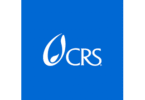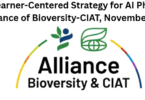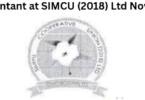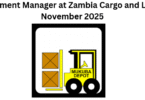Vacancies Announcement
Background
The Project ‘Food Systems Land Use and Restoration in Tanzania’s Forest Landscapes’ is a child project under the GEF Food Systems, Land Use and Restoration (FOLUR) Impact Program. The 5-year project is implemented through the Ministry of Natural Resources and Tourism, as the lead Executing Agency, with the support of the World Wildlife Fund (WWF) as GEF Implementing Agency.
The key environmental problem to be addressed by the project is the degradation of Tanzania’s rich forest lands and wetlands and the related loss in forest health and biodiversity, under the pressure of agricultural development, with a focus on rice production, which has detrimental effects on the delivery of ecosystem services and related livelihood and economic opportunities. In Tanzania, rice production has more than tripled between 2004 and 2015, making lanzania the 2 largest nce producer in South- Eastern Afica. The nice sector is currently a key point of attention of various Government and donor supported programs geared towards both intensification and extensification, with a growing interest in export to supply adiacent Africa states. A key challenge is that production is small scale,with current yields are among the lowest in the world (between 1.5 and 2 tha), inefficient supply chains, post-harvest handling and poor transport networks, posing additional challenges.
The project focuses primarily on two landscapes in Tanzania, both critical for rice cultivation: the Kilombero Valley on mainland Tanzania; and the North Unguja (Zanzibar) landscape. The project represents an integrated approach that combines aspects of sustainable food systems and deforestation free supply chains, with broader landscape level planning, management and restoration for the preservation of ecosystem services in these two landscapes, which translates into three main pillars of work:
- The development of an Integrated Landscape Management approach for the target landscapes, through a multi-stakeholder process, in order to provide for a landscape management framework that gives space for rice production and other uses, while securing space for the preservation and restoration of critical ecological systems;
- The development of sustainable and socially inclusive value/supply chains for the rice production sector, including the development of supporting governance/policy frameworks, financial and market mechanisms and incentives that will drive sustainable value chains; and
- The development and implementation of concrete landscape restoration and management activities in the target landscapes, including the creation of enabling conditions for upscaling. The focus here will be on areas degraded by or providing key environmental services to the rice sector.
Position: Gender and Safeguards Specialist
- Reports to: Project Coordinator, Tanzania Food Systems, Land Use and Restoration Project
- Location: Dodoma,Tanzania
- Duration: 1 year
Major Function
The project emphasizes gender-responsive and socially inclusive approaches, ensuring that women, youth, and marginalized groups actively participate in planning,decision-making,and benefit-sharing.It also emphasizes the need for safeguards measures to be put in place to prevent any adverse social and environmental impacts the need for sateguards measures to be put in place to prevent any adverse social and environmental impacts to lead in the development and support the implementation of the Gender Action Plan (GAP), delivery of the Stakeholder Engagement Plan(SEP) and the Environmental and Social Management Framework (ESMF) with related Process Framework (PF), including providing oversight on safeguards and social inclusion across the project.
This role will also provide technical guidance across Components 1-3 of the project, ensuring that equity, inclusion, and safeguards considerations are mainstreamed into peer-to-peer exchanges, learning platforms, country engagement, and global knowledge sharing.
Key Responsibilities
Environmental and Social Safeguards
- Ensuring that bidding documents and contracts include any relevant particular clauses or conditions relevant to environmental and social safeguards as set out in the Environmental and Social Management Framework (ESMF), the Gender Action Plan and the Stakeholder Engagement Plan (SEP)
- Review project activities to ensure potential social and environmental risks are identified early and that adequate mitigation measures are in place.
- In Lline with the ESMF, prepare site-specific Environmental and Social Management Plans(ESMPs)
- Monitor safeguard compliance by contractors and executing partners, ensuring remedial actions are applied where needed
- Provide training on safeguards requirements to Project Management Unit(PMU) and Landscape Coordination Unit(LCU) staff
- Support national agencies and project partners in meeting government and WWF/GEF safeguard standards
- Develop simple safeguard monitoring tools (e.g., checklists, templates) for use by project staff and artners. This includes tools to monitor that application of the GAP and the SEP
- Provide safeguards and gender oversight for field activities, peer-to-peer exchanges, and capacity-building activities
- Deliver capacity-building sessions for partners and country teams on safeguards, gender, and social inclusion in freshwater restoration
- Participate in joint technical missions and site visits with the PMU to ensure stakeholder engagement, safeguards and gender aspects are applied consistently
- Guide and support the establishment Grievance Redress Mechanisms for the two landscapes and central project management unit
- Contribute to quarterly, semi-annual, and annual project reports with safeguards and gender inputs
- Ensure lessons learned on gender equality and safeguards are captured and shared through global platforms and communications materials
Gender Mainstreaming and Stakeholder Engagement
- Lead and track implementation of the Gender Action Plan (GAP), ensuring gender mainstreaming across all components of the project
- Provide overall oversight of implementation of the Stakeholder Engagement Plan during project implementation
- Provide training on gender mainstreaming and stakeholder engagement requirements to Project Management Unit(PMU)and Landscape Coordination Unit(LCU)staff
- Collaborate with the Monitoring and Evaluation Officer to integrate gender-responsive indicators into reporting and knowledge products
- Review annual workplans and budgets to ensure activities support equitable participation of women, youth, and marginalized groups
- Provide advice on addressing gender-related risks (e.g., Gender-based Violence, Sexual Exploitation, Abuse, and Harassment) in the context of project activities
- Design and promote methodologies for gender-sensitive participation in technical exchanges, roundtables, and restoration planning
- Work with the Project Coordinator, Landscape Coordinators and technical experts associated with the project to promote inclusive participation of women, youth, persons with disabilities, and vulnerable groups in decision-making
- Contribute gender-related inputs to project Results Framework reporting, reflection workshops, and adaptive management discussions
- Regularly review and update the Grievance and Redress Mechanism(GRM) to ensure it is responsive to the needs of women and vulnerable groups
- Provide overall oversight of environmental and social safeguard measures during project implementation
Qualifications and Requirements
- At least 7 years of technical working experience as a Safeguards and/or Gender Mainstreaming expert
- Post-graduate degree in social sciences, gender studies, community development, natural resource management or a related field in social or environmental sciences
- Knowledge of Safeguards and/or Gender Mainstreaming
- Ability to interact with senior government staff and partners
- Adaptive management skills
- Experience in delivering technical reporting to donor agencies on large projects
- Fluency in written and spoken English and Kiswahili
- Experience with GEF Projects and GEF knowledge an advantage
General Conditions
- All applicants must be Citizens of Tanzania with age not above 50 years
- Applicants must attach an up-to-date Curriculum Vitae(CV)having reliable contacts; postal address/post code,e-mail and telephone numbers.
- Applicants should apply on the strength of the information given in this advertisement.
- Applicants must attach their certified copies of the following certificates.
- Postgraduate/Degree/Advanced Diploma/Diploma/Certificates.
- Postgraduate/Degree/Advanced Diploma/Diploma transcripts.
- Form IV and Form VI National Examination Certificates.
- Professional Registration and Training Certificates from respective Registration or Regulatory Bodies, (where applicable).
- Birth certificate.
- Attaching copies of the following certificates is strictly not accepted:-
- Form IV and form VI results slips.
- Testimonials and all Partial transcripts.
- An applicant employed in the Public Service should route his application letter through his respective employer.
- An applicant who is retired from the Public Service for whatever reason should not apply.
- An applicant should indicate three reputable referees with their reliable contacts
- Certificates from foreign examination bodies for Ordinary or Advanced level education should be verified by The National Examination Council of Tanzania (NECTA).
- Professional certificates from foreign Universities and other training institutions should be verified by The Tanzania Commission for Universities(TCU) and National Council for Technical Education (NACTE).
- A signed application letter should be written either in Swahili or English and Addressed to;
- Permanent Secretary,
- Ministry of Natural Resources and Tourism.
- Government City-Mtumba,
- Ardhi Street
- P.O. Box 1351,
- DODOMA.
- Deadline for application is 20th November, 2025;
- Only shortlisted candidates will be informed on a date for interview and;
- Presentation of forged certificates and other information will necessitate to legal action;
Check all: JOBS IN TANZANIA
Go to our Homepage To Get Relevant Information.




